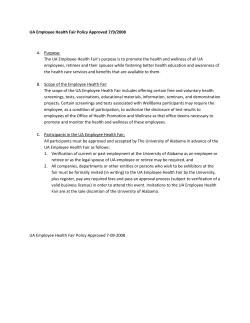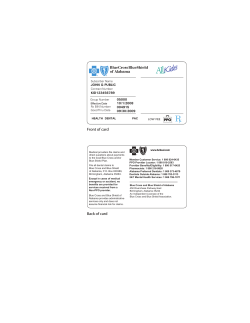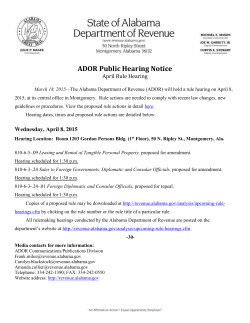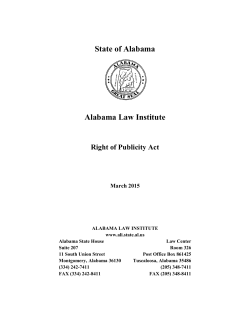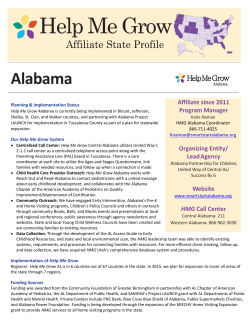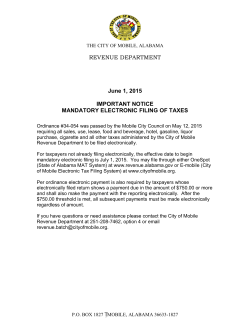
April 20, 2015 The Honorable Mike Hubbard
April 20, 2015 The Honorable Mike Hubbard Speaker Alabama House of Representatives State Capitol Montgomery, Alabama 36130 Re: Senate Bill 197 as amended in the House – Opposed Dear Speaker Hubbard, Media Coalition believes that the House amendment to Senate Bill 197 that creates a carve out to the exception for expressive works will threaten the First Amendment rights of creators, producers and distributors of non-commercial content. It makes them more vulnerable to litigation, which will have a chilling effect on their protected speech. The trade associations and other organizations that comprise Media Coalition have many members throughout the country, including Alabama: publishers, booksellers and librarians as well as manufacturers and retailers of recordings, films, videos and video games. S.B. 197 creates a right of publicity in an individual’s “indicia of identity” including, but not limited to, name, signature, photograph, image, likeness, voice or other “similar imitation.” Section 4 of the bill provides an exception to the right for a wide range of expressive uses. It protects artistic and creative works and allows books, plays, magazines, newspapers, music, film, radio, television and other media to use the “indicia of identity” of a living or deceased person in fictional and non-fictional works. This exception for artistic and creative uses has generally been included in state laws granting a statutory right of publicity. The amendments added to the bill in the House Judiciary Committee remove from this exception any artistic work that is “a replica as to constitute a copy” of a person’s “indicia of identity.” Those non-commercial uses are only exempt from the right of publicity to the extent they are protected by the U.S. and Alabama Constitutions. The purpose of the exception for artistic and creative uses in Section 4 of the bill, as passed by the Senate, is to avoid the threat of such costly litigation for creators and distributors of what is plainly non-commercial speech. Amending S.B. 197 to carve out certain uses from the exception will have a substantial chilling effect on First Amendment protected speech by increasing the likelihood that publishers, filmmakers and others will be forced to litigate to vindicate their First Amendment rights in court. Instead, it requires a court to rule that the speech is not subject to the right of publicity because the First Amendment protects the use. As a Letter to House Speaker Hubbard re: Alabama S.B. 197 April 20, 2015 Page 2 result, a noted public figure, or his or her heirs, upset about an uncomplimentary book or film, could force the publisher or producer to defend the work in court, rather than being able to rely on the list of exceptions in Section 4 to lessen the time and cost of the litigation. Such lawsuits can take years to decide and cost hundreds of thousands of dollars or more. Many producers and distributors of biographies, histories, documentaries and other important social commentary may not have the financial resources to defend themselves in court. In some cases, they will selfcensor to avoid the mere threat of costly and prolonged legal fight. Also, if S.B. 197 becomes law with these amendments, Alabama could become a magnet for plaintiffs looking to sue producers and publishers of media content that has been carved out of artistic and creative use exception, because almost every other state that grants a statutory right of publicity has the list of exceptions for non-commercial uses without this carve out. The threat of a lawsuit is not lessened by the provision in the House amendment that says nothing in the law abridges any speech protected by the Constitutions of the United States or Alabama. The protections of the Alabama and U.S. Constitutions are inherent in all Alabama statutes. As a result, S.B. 197 would remove the specific, statutory list of exempted material and replace it with general constitutional protections that are already an inalienable part of this and every Alabama law. The publisher or producer must still validate their First Amendment rights in court to distribute it, rather than being able to rely on the exception to seek dismissal of litigation in a more timely fashion. The legislation may also be unconstitutionally vague because it does not define “a replica as to constitute a copy.” Certainly most photographs are replicas that constitute a copy. The term could include the use of historic footage in films such as Forrest Gump or Zelig. A broad reading of the term could apply to an uncanny impersonation like Tina Fey’s portrayal of Sarah Palin in a Saturday Night Live skit. Also, the “indicia of identity” is defined as “including but not limited to” the common examples of elements of identity such as name and likeness. What these other indicia are is not defined and leaves a creator or distributor of content vulnerable to being sued. Since these are core elements used to determine whether such speech is protected by the creative use exception, they must be clearly defined to give speakers advance notice of their obligations under the law. The vagueness in the legislation likely violates the Due Process Clause of the Constitution. “It is a basic principle of due process that an enactment is void for vagueness if its prohibitions are not clearly defined.” Grayned v. City of Rockford, 408 U.S. 104, 108 (1972). The requirement of clarity is especially stringent when a law interferes with First Amendment rights. Vill. of Hoffman Estates v. Flipside, Hoffman Estates, Inc., 455 U.S. 489, 499 (1982); Keyishian v. Bd. of Regents, 385 U.S. 589, 604 (1967) (quoting NAACP v. Button, 371 U.S. 415, 432-33 (1963)) (“‘Because First Amendment freedoms need breathing space to survive, government may regulate in the area only with narrow specificity.’”). If you would like to discuss further our concerns about this bill, please contact me at 212587-4025 #3 or at horowitz@mediacoalition.org. Letter to House Speaker Hubbard re: Alabama S.B. 197 April 20, 2015 Page 3 We urge you to protect the First Amendment rights of all the people of Alabama and reject any amendments to S.B. 197 that will undermine the constitutional rights of creators, producers and distributors of media. Respectfully submitted, David Horowitz Executive Director
© Copyright 2025

